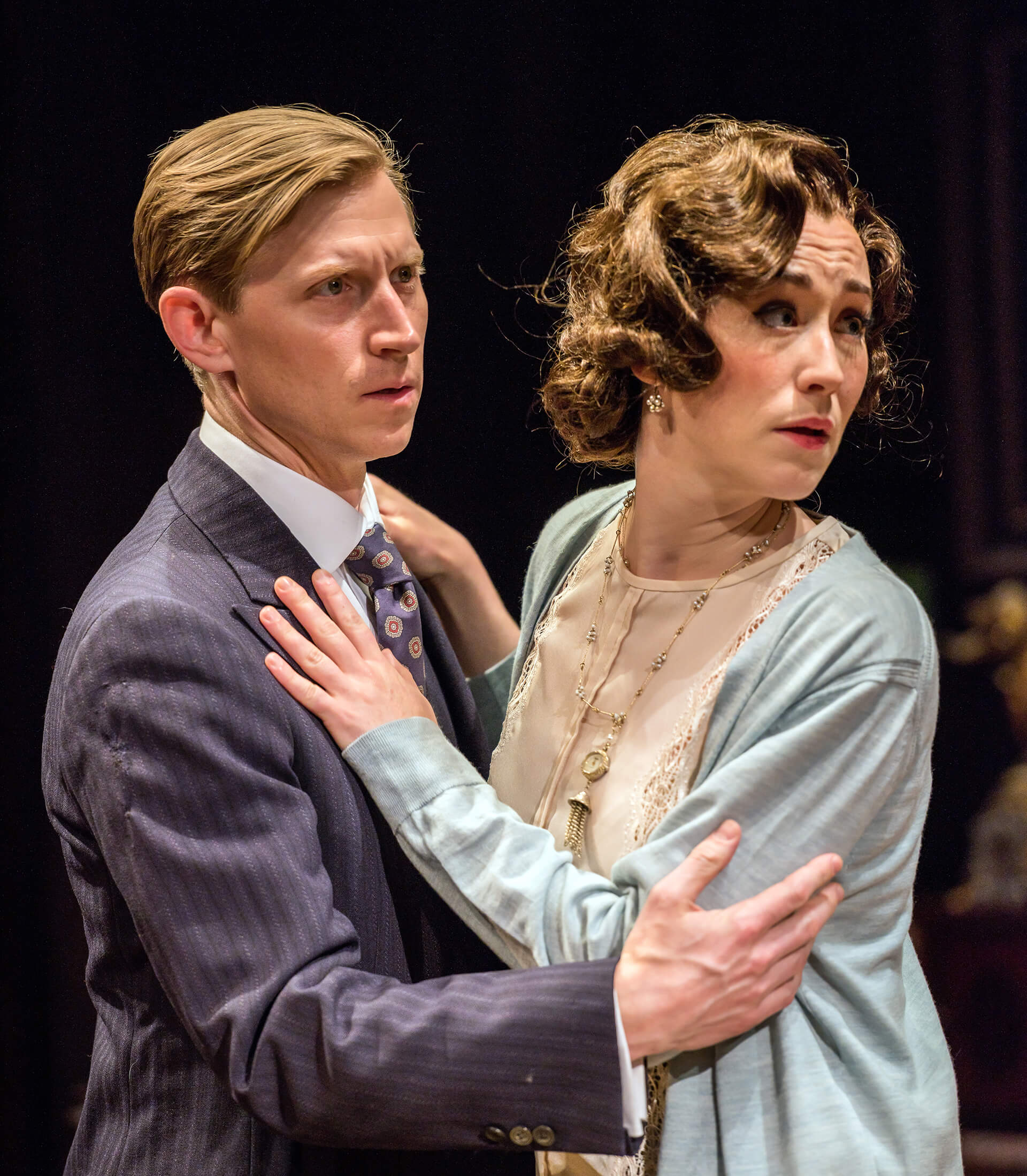Conflict - A Love Story


In, Conflict – A Love Story, the action pivots around the debate between capitalism and socialism; between that which businessmen contrive, and that for which the common man strives. That this Off Broadway revival of Miles Malleson’s political comedy is set (John McDermott) as extravagantly as a Broadway show is something of a provocation, in that regard.
Even more irreverent, budget wise, for an Off Broadway show, are the costumes (Martha Hally), especially those worn by The Lady Dare Bellingdon (Jessie Shelton), who well affords her shopping habit.
In this rom com set in London in the early 1920s, appearances are all the stuff of politics, as well as theater. Set in the period following WWI, real men, such as Major Sir Ronald Clive, D.S.O. (Henry Clarke) have earned their stripes fighting for their country. And other men — approximately two million — are out of work, without any opportunities at all. As Tom Smith (Jeremy Beck), the socialist candidate for Parliament reports it, there are 47 million people in England, and 40 million of them are poor.
Regardless of the seriousness of these issues, the plot is a series of contrivances — surprises, in effect, that for their transparency, provoke a great deal of jocularity. As the play opens, an interloper, Tom Smith, deftly portrayed by Jeremy Beck, smuggles his way into Lord Bellingdon’s (Graeme Malcolm’s) mansion, where he’s caught swiping a bunch of cigarettes, before Bellingdon and Clive, Lady Dare’s suitor, catch him in the act.
That he persuades them to listen to his story may be literally absurd, given that most victims don’t fraternize with their burglars, but these two men do. And Clive learns that Tom was a younger classmate at Cambridge, where he studied music, as well as a soldier in his troupe when he was an army Major.
Explaining in detail his sad turn of fate, while swilling down a fifth of Lord Bellingdon’s scotch, Tom gains a reprieve from their initial plan, to have him arrested. Quite to the contrary, Bellingdon and Clive stuff his shabby suit pockets with enough money for him to get himself back on his feet.
He is transformed, becoming the Labour Party’s contender for the Parliamentary seat — the same one for which Clive is running.
When Act III kicks off, Smith is sitting in his sparse, one-room apartment conversing with his landlady. Expressing her negativity about politicians and politics, Mrs. Robinson, a wily Amelia White, entreats Smith with the news that he doesn’t stand a chance against the Torys. One day a year they invite the working class to ride in their limos, while they behave with solicitous respect. “Yes . . . that’s one day in the year; the other three ’undred and sixty-four they’d as soon run over yer as look at yer!” she said.
Complications ensue, as Lady Bellingdon falls in love with Tom’s idealism — then with Tom. Indeed, in his quest for a better world, he’s also faced with the mysteries of self. And it’s Dare, aptly named, who unites these two sides of Tom.
In portraying the independent woman at a time when women were not yet allowed to vote, Jessie Shelton brings a sense of cache, and a lot of mischief. Even Lord Bellingdon, the staunch Tory, is caused to succumb to his daughter’s higher aspirations. Graeme Malcolm plays the blustering old man with ease and dignity. And as Dare’s suitor, Henry Clarke makes for a dashing Clive. Beneath the surface he is an innocent, in a way that only a very wealthy young man may be.
Directed by Jenn Thompson, the production is smooth, well-paced, and fashionably designed. These well-seasoned actors bring the period in which it’s set gleefully to life. It’s especially gratifying to watch Old World values take the blunt of the humor.
Produced by The Mint Theater, whose mission it is to excavate lost and forgotten works, the production is currently at Theatre Row, The Beckett Theatre.
Desperate Measures
The 2017-18 season’s sleeper, Desperate Measures, garnered multiple Off Broadway Awards at The York Theatre Company, where it premiered. A small stage musical, it’s clever, humorous, and enchanting in the end. And it continues to have a life of its own at New World Stages.
Loosely based on Shakespeare’s Measure for Measure, the show owes more to the Bard’s use of iambic pentameter and his fascination with dual identities than it does to the actual plot. A musical comedy Western, Desperate also owes more to Marx Brothers comedies than it does to classical musicals of its ilk, like Oklahoma or Annie Get Your Gun.
Peter Saide plays the handsome Sheriff who opposes the corrupt Governor von Richterhenkenpflichtgetruber (Nick Wyman) and who seeks to save Johnny Blood (Conor Ryan) from hanging for murder.
A misguided albeit good-hearted, red-blooded youth, Johnny’s only crime was murdering the man who hit on his girl, Bella Rose (Lauren Molina), a stripper at the saloon. Hence, a series of dancing acts of the vaudevillian ilk, and jokes to match, carry some of the action.
To save Johnny’s life, the Sheriff enlists his reluctant sister, the novice Sister Mary Jo (Sarah Parnicky), who lives at a nearby convent. An ingenue with a prickly sensibility and a hard-nosed sense of justice, she’s out for no one, other than herself, fortunately.
Indeed, characters run amok. In an effort to trick the Governor into freeing Johnny, Bella Rose doubles as Sister Mary Jo, while the local pastor, the alcoholic Father Morse (Gary Marachek), tries to reconcile Nietzche’s nihilism with his own beliefs. It’s not logic that drives this comedy, as much as the desire to fracture it into its funny little parts.
Peter Kellogg’s book is a madcap caper written in iambic pentameter, with delightful irreverence to theatrical convention. Kellogg’s tongue in cheek lyrics, set to David Friedman’s old-time, cheerful melodies, carry the show.
And with James Morgan’s set leaving so many obvious openings for Johnny’s escape, it’s hard to know how any of this stays on the stage. At times, it really doesn’t.
It’s a small, well-knit cast with Conor Ryan singing for his life. He’s a heart throb! Gary Marachek, shows off his chops in a variety of roles. There is even a classic romantic duo in Sarah Parnicky and Peter Saide. All brought together under Bill Castellino’s swift direction.



